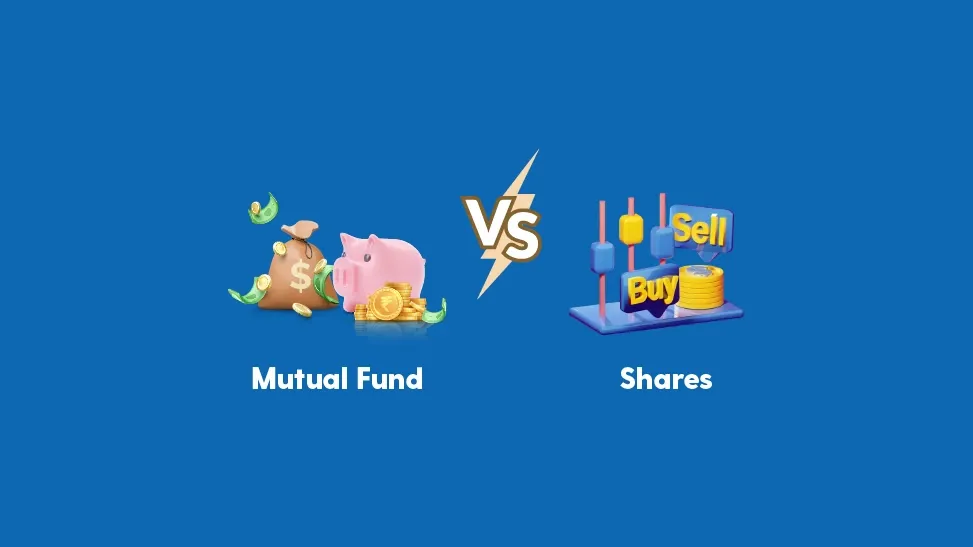- Home
- Blog
- Mutual Funds
- Mutual Funds vs Shares: Which Investment Option is Right for You?
- Mutual Funds vs Shares: Which Investment Option is Right for You?
Mutual Funds vs Shares: Which Investment Option is Right for You?

- Published Date: November 19, 2024
- Updated Date: August 11, 2025
- By Team Choice
Stocks offer direct ownership and high returns but come with higher risks. Mutual funds are managed by experts, provide diversification, and are safer, making them ideal for beginners or low-risk investors.
What Are Mutual Funds?
Mutual funds are professionally managed investment vehicles that pool money from multiple investors to invest in a variety of securities, including stocks, bonds, and other share market instruments. These funds are managed by experienced fund managers who aim to maximize returns while minimizing risk.
Key Features of Mutual Funds
- Diversification: Spreads investments across various assets to reduce risk.
- Professional Management: Handled by skilled fund managers with market expertise.
- Low Entry Point: Start investing with as little as ₹500 through SIPs (Systematic Investment Plans).
- Transparency: Regular updates on portfolio performance and holdings.
- Variety of Options: Includes equity, debt, hybrid, and sector-specific top funds.
What Are Shares?
Shares represent ownership in a company. When you buy shares, you essentially become a part-owner of that company. Your returns depend on the company’s performance, and you can earn through capital appreciation and dividends.
Key Features of Shares
- Direct Ownership: Gives you a stake in the company and voting rights.
- High Returns Potential: Offers significant returns if the company performs well.
- Liquidity: Easily tradable on stock exchanges like NSE and BSE.
- Transparency: Company financial reports and market data are readily available.
- Volatility: Share prices can fluctuate significantly, reflecting market conditions and company performance.
Mutual Funds vs Shares: A Comprehensive Comparison
| Parameter | Mutual Funds | Shares |
|---|---|---|
| Risk | Lower, due to diversification | Higher, depends on individual stocks |
| Returns | Moderate, steady over time | High, but unpredictable |
| Control | Limited, managed by professionals | Full, you decide your investments |
| Expertise Required | None, handled by fund managers | High, requires market knowledge |
| Liquidity | High, but may involve exit loads | Very high, instant buy/sell possible |
| Minimum Investment | As low as ₹500 in SIP | Varies, based on share prices |
| Transparency | Regular performance updates | Detailed company reports available |
Advantages of Investing in Mutual Funds
- Diversification: Mitigates risk by spreading investments across multiple asset classes.
- Professional Expertise: Fund managers actively manage portfolios to optimize returns.
- Beginner-Friendly: Ideal for individuals with limited market knowledge.
- Systematic Investment Option: SIPs allow disciplined and regular investments.
- Tax Benefits: Some mutual funds, like ELSS, offer tax deductions under Section 80C.
Advantages of Investing in Shares
- High Returns Potential: Individual stocks can deliver substantial returns over time.
- Ownership Benefits: Shareholders have voting rights and receive dividends.
- Transparency: Detailed financial reports allow for informed decisions.
- Flexibility: Investors have full control over buying, selling, and holding shares.
- Short-Term Opportunities: Suitable for those seeking quick gains through trading.
Which Is Better: Mutual Funds or Shares?
The choice depends on several factors, including your risk tolerance, financial goals, and investment knowledge.
Choose Mutual Funds if:
- You’re a beginner or have limited time to track the stock market.
- You prefer steady, long-term growth with moderate risks.
- You want a hands-off investment approach managed by professionals.
Choose Shares if:
- You’re comfortable with market fluctuations and can handle risks.
- You have the time and knowledge to analyze companies and make informed decisions.
- You’re aiming for higher returns in the short or long term.
Types of Mutual Funds
- Equity Mutual Funds: Primarily invest in stocks for long-term growth.
- Debt Mutual Funds: Focus on fixed-income securities like bonds and treasury bills, offering stability.
- Hybrid Mutual Funds: Combine equity and debt for balanced growth and stability.
- Index Funds: Track specific market indices like Nifty 50 or Sensex.
Mutual Funds vs Shares: Tax Implications
Mutual Funds:
- Equity funds are taxed at 10% for long-term gains above ₹1 lakh (held for more than a year).
- Short-term gains are taxed at 15%.
- Debt funds have different tax structures, depending on the holding period.
Shares:
- Long-term gains (held for over a year) above ₹1 lakh are taxed at 10%.
- Short-term gains are taxed at 15%.
Also Read: Tax vs Investing
FAQs on Mutual Funds vs Shares
1. Are mutual funds safer than shares?
Yes, mutual funds are safer because they diversify investments, reducing the risk of loss.
2. Can I invest in both mutual funds and shares?'
Yes, combining both can create a balanced portfolio that maximizes returns while minimizing risks.
3. Which offers higher returns: mutual funds or shares?
Shares generally offer higher returns but carry more risk. Mutual funds provide moderate, consistent returns.
4. Do mutual funds invest in shares?
Yes, equity mutual funds invest in shares, but they diversify to minimize risks.
5. Are mutual funds good for short-term goals?
Debt mutual funds can be suitable for short-term goals due to their stability.
6. Is it better to start with shares or mutual funds?
If you’re a beginner, starting with mutual funds is advisable as they require no market expertise.
Conclusion
Both mutual funds investment and shares have their advantages and limitations. If you’re new to investing, mutual funds provide a safer and simpler option. On the other hand, shares are ideal for seasoned investors willing to take calculated risks for potentially higher returns. A diversified portfolio with a mix of both can help you achieve your financial goals more effectively.
Recommended for you

What is OTM in A Mutual Fund

Market Prediction Today (18th February 2026)

How Mutual Funds Make Money
